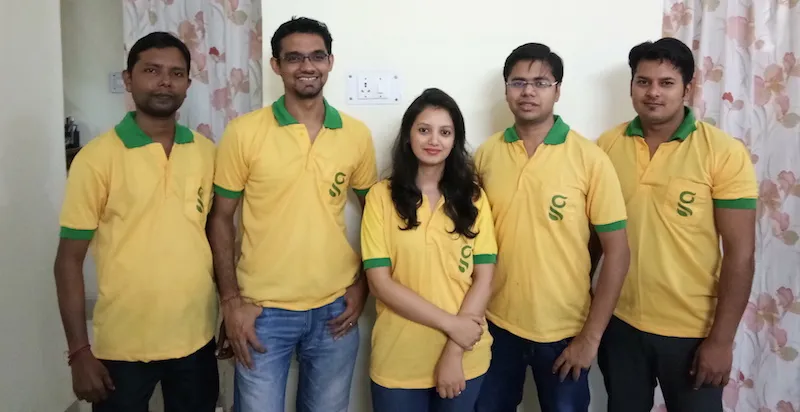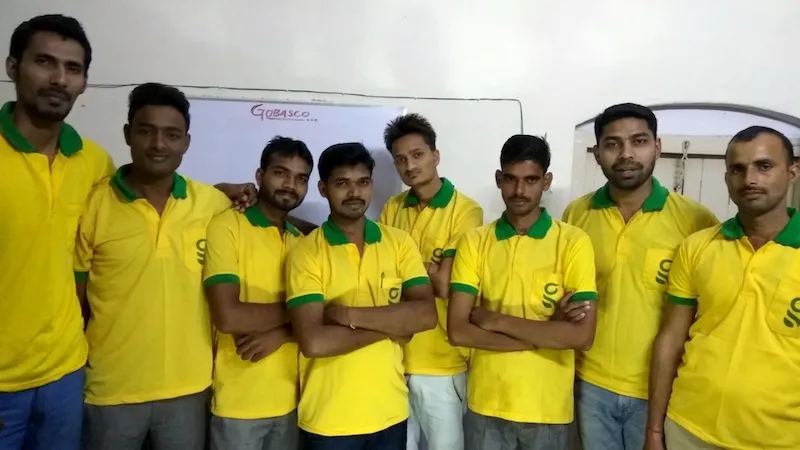Matrix Partners makes its first move in agri-tech sector, invests in Gobasco
Gobasco, an agri-tech startup that solves complex supply chain optimisation problems, has raised an undisclosed amount in seed funding from Matrix Partners India.
It all started with Vedant Katiyar's exploration of the curious case of a bag of potatoes from Kannauj to Kathmandu that motivated him to dig deep into India’s complex and highly inefficient agro supply chain. He started collecting data from various sources to better understand the supply chain and took help from Abhishek Sharma to crunch through the unstructured pool of data for crucial insights.
Huge inefficiencies quickly came to light and that's when Gobasco formally took birth in early 2017.

With Gobasco, Co-founders Vedant and Abhishek aim to optimise the agro-supply chain from farm to fork. They are focusing on better operational efficiency, improved realisations for farmers, reduced wastage, and enhanced price and market discovery for agro-commodities.
Vedant is an alumnus of BITS Pilani and FMS Delhi, and his family runs cold storages in Uttar Pradesh. Abhishek, an IIT Roorkee and University of Maryland (PhD in AI) alumnus, was an AI researcher at Apple.
Gobasco uses data-driven identification and treatment of the sources of inefficiencies with the use of AI-powered processes and pipelines. The startup recently raised an undisclosed amount in seed funding from Matrix Partners India.
Abhishek says, “We have conducted a thorough research for more than 18 months. This involved collecting and analysing a large amount of data from various channels to develop unprecedented insights into every stage of the current agro-supply chain.”
This helped the company better understand some of the major sources of inefficiencies - as the high cost of procurement, multiple intermediaries, sub-optimal transportation and high standardisation cost - and deal with them.
Gobasco focuses on optimising the supply chain and is not limited by customer dependence. It is asset light and makes optimal use of already existing infrastructure that supports the current supply chain. This has also helped the company achieve profitability early on.
The ‘tech’ in agri-tech
For Gobasco, the large-scale data analysis for data coming in multiple streams, formats and language with the use of cutting-edge NLP and AI tools is a major breakthrough that gives them a definitive edge over the others, organised and unorganised players. Some of the innovative technologies the company has developed in-house include:
- Commodity flow map
- Customer preference map
- Credit rating system
- GoProcure AI tool
- Price prediction modules
Where’s the money?
Gobasco, through its proprietary optimisation engines and pipelines, cuts down the cost of the supply chain and also enhances the commodity pricing leading to solid margins. The company purchases from farmers and sells to bulk buyers and traders.
Currently, Gobasco is experiencing a latent demand of 6,000 tonnes of fruits and vegetables per month from bulk buyers. However, it has been only partially fulfilling this due to limited cash flow and human resources. The current seed funding from Matrix Partners will take care of these restrictions. Within 3 months of full-scale operations, Gobasco has transacted with 500+ farmers and buyers across 15 locations, both nationally and internationally. Gobasco is currently operational out of NCR & Lucknow.
Gobasco’s monthly revenue ranges from Rs 0.7 to 1 crore and the company is growing at 40 percent month on month. The company is targeting Rs 12 crore of monthly net run rate by the end of 2018.
Matrix’s first agri-tech investment
According to Rajinder Balaraman, Vice President, Matrix India, the investment firm doesn’t want to think of specific sectors. Going by its philosophy of being a founder’s first firm, it’s more about “listening to the founder’s vision and going where the vision clicks”.
The conversation between Gobasco and Matrix Partners started four months ago.
Rajinder points out three factors that led them to invest in Gobasco. These are the founders’ chemistry, the plan to cut out intermediaries and a fresh approach to building, and the tech focus that allows them to build a unique solution using AI.
Where will the funding go?
Gobasco will use the capital mostly for expanding operations and the technology team, and towards building a completely automated platform to leverage real-time data-analytics and AI-powered pipelines.
Abhishek says,
The seed round gives us a runway for 2 years but we may venture into some untapped optimisation levers that might need some initial set-up cost. If we decide to do so, we would need to raise another round for that.
The agri-tech market
The agri-tech market size is roughly $300 billion, which is still largely untouched by organised sectors due to the inherent difficulties in analysing the vastly complicated supply chain spread across the length and breadth of the country. The unorganised sector constitutes roughly 97 percent of the current agro-supply chain for F&V commodities.

While Grofers, Bigbasket and NinjaCart are looking into this sector from different angles with a customer focus strategy, there are some noticeable innovations over the last one year.
Delhi-headquartered agri supply chain startup Crofarm buys fresh vegetables and fruits directly from farmers and supplies them to online and offline retailers in an efficient manner. The company raised Rs 5 crore in a pre-series A round led by US-based venture development firm Factor[e] with participation from its early stage investors Rajan Anandan and Jitendra Gupta. BigHaat, an agri-commerce startup, provides farmers with quality agro inputs and accessories through a marketplace platform. Agri-equipment rental marketplace Ravgo offers small farmers, who cannot afford ownership of expensive machinery, access to modern technology. Jayalaxmi Agrotech, a crop-specific app in English and regional languages, helps farmers minimise crop loss and improve productivity.
Gobasco, meanwhile, is keen to wed large-scale data integration and proprietary technology to bring transparency to commodity supply, from farm to fork. This injection of funds may help do just that!







